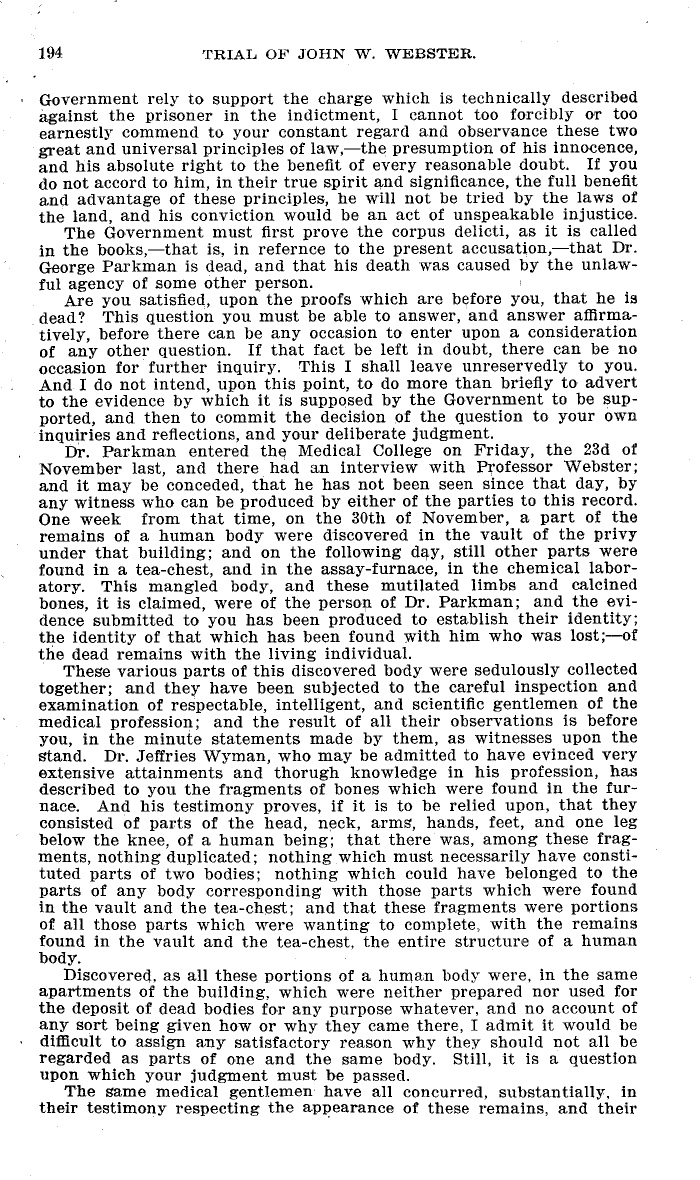|
194 TRIAL OF' JOHN W. WEBSTER.
Government rely to support the charge which is technically described
against the prisoner in the indictment, I cannot too forcibly or too
earnestly commend to your constant regard and observance these two
great and universal principles of law, the presumption of his innocence,
and his absolute right to the benefit of every reasonable doubt. If you
do not accord to him, in their true spirit and significance, the full
benefit
and advantage of these principles, he will not be tried by the laws of
the land, and his conviction would be an act of unspeakable injustice.
The Government must first prove the corpus delicti, as it is called
in the books,-that is, in refernce to the present accusation,-that Dr.
George Parkman is dead, and that his death was caused by the unlaw-
ful agency of some other person.
Are you satisfied, upon the proofs which are before you, that he is
dead? This question you must be able to answer, and answer affirma-
tively, before there can be any occasion to enter upon a consideration
of any other question. If that fact be left in doubt, there can be no
occasion for further inquiry. This I shall leave unreservedly to you.
And I do not intend, upon this point, to do more than briefly to advert
to the evidence by which it is supposed by the Government to be sup-
ported, and then to commit the decision of the question to your own
inquiries and reflections, and your deliberate judgment.
Dr. Parkman entered the Medical College on Friday, the 23d of
November last, and there had an interview with Professor Webster;
and it may be conceded, that he has not been seen since that day, by
any witness who can be produced by either of the parties to this record.
One week from that time, on the 30th of November, a part of the
remains of a human body were discovered in the vault of the privy
under that building; and on the following day, still other parts were
found in a tea-chest, and in the assay-furnace, in the chemical labor-
atory. This mangled body, and these mutilated limbs and calcined
bones, it is claimed, were of the person of Dr. Parkman; and the evi-
dence submitted to you has been produced to establish their identity;
the identity of that which has been found with him who was lost; of
the dead remains with the living individual.
These various parts of this discovered body were sedulously collected
together; and they have been subjected to the careful inspection and
examination of respectable, intelligent, and scientific gentlemen of the
medical profession; and the result of all their observations is before
you, in the minute statements made by them, as witnesses upon the
stand. Dr. Jeffries Wyman, who may be admitted to have evinced very
extensive attainments and thorugh knowledge in his profession, has
described to you the fragments of bones which were found in the fur-
nace. And his testimony proves, if it is to be relied upon, that they
consisted of parts of the head, neck, arms, hands, feet, and one leg
below the knee, of a human being; that there was, among these frag-
ments, nothing duplicated; nothing which must necessarily have consti-
tuted parts of two bodies; nothing which could have belonged to the
parts of any body corresponding with those parts which were found
in the vault and the tea-chest; and that these fragments were portions
of all those parts which were wanting to complete, with the remains
found in the vault and the tea-chest, the entire structure of a human
body.
Discovered, as all these portions of a human body were, in the same
apartments of the building, which were neither prepared nor used for
the deposit of dead bodies for any purpose whatever, and no account of
any sort being given how or why they came there, I admit it would be
difficult to assign any satisfactory reason why they should not all be
regarded as parts of one and the same body. Still, it is a question
upon which your judgment must be passed.
The same medical gentlemen have all concurred, substantially, in
their testimony respecting the appearance of these remains, and their
|

